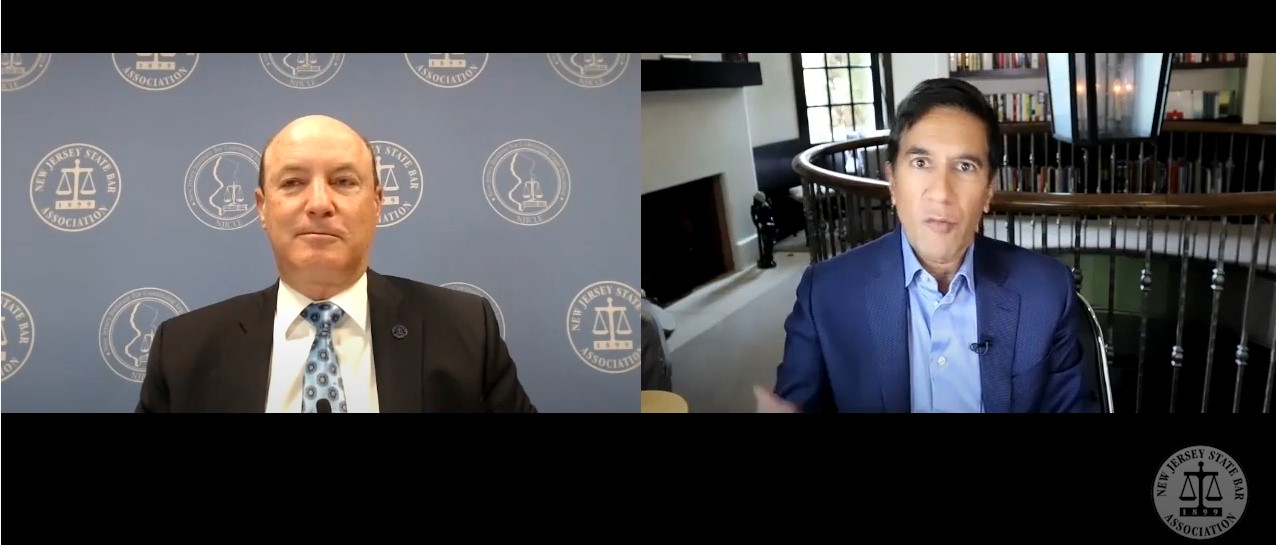Research shows there are steps individuals can take to maintain and improve brain health, said CNN’s Chief Medical Correspondent Sanjay Gupta during his keynote presentation Wednesday during the three-day New Jersey State Bar Association (NJSBA) virtual Annual Meeting, which began today.
Gupta, who is also a practicing neurosurgeon, discussed insights gleaned from top scientists around the world that he reported in his new book, Keep Sharp: Build a Better Brain at Any Age, in an hourlong discussion with NJSBA 2021-2022 President Domenick Carmagnola. 
Carmagnola noted that “as lawyers, there are few issues as important as keeping our brain sharp—for ourselves, for our families, for our clients.”
An alarming 40 million to 50 million Americans have evidence of pre-clinical dementia, but contrary to popular belief, dementia and mental decline as we age are not inevitable, Gupta said.
Instead, a growing body of research shows new brain cells can be grown at any age, he said.
“It was revelatory research,” Gupta said.
The prevailing belief has been that neurogenesis, or the creation of new brain cells, happens only in babies— when the brain is still forming— and after someone suffers a traumatic brain injury, such as stroke.
The new research inspired Gupta to probe the question in his book: if the brain can grow healthy new cells, how can you make it happen?
Gupta discussed some of the ways to optimize brain health, which he details in his book with practical strategies he calls the SHARP brain health program. The recommendations include commonsense information about how to achieve better health, such as: reduce sugar consumption, increase hydration and moderate exercise and eat more vegetables and foods with omega-3s.
“I’m telling you things you the things you’ve heard anytime you’d gotten any kind of health information. I do think the brain is a bit different in terms of how it responds. There is a best way to live for your brain health,” he said.
The most important action an individual can take toward better brain health is to decrease sugar in their diet, Gupta said.
While we all know we eat too much sugar, he said, you may not know Americans eat about 130 pounds of sugar a year, which the human body is not designed to absorb. Or that the brain requires a lot of blood flow and energy— excess sugar causes receptors in the brain too turn off.
“You can over-feed the body and starve the brain,” Gupta said.
Gupta also explained that because the brain is a vascular-dependent organ, it requires hydration. Being even slightly dehydrated “can have an objective impact on performance,” and increasing hydration by 2% can have a “measurable impact on cognitive function,” he said.
“People intuitively know this, but I hope that this is extra motivation for people to think about how they’re fueling and nourishing their body,” Gupta said.
Carmagnola noted that lawyers pride themselves on being problem-solvers and that Gupta’s book defines the problem and provides the solution to improving brain health with an easy-to-follow guide that can be incorporated into daily lives.
He asked Gupta to comment on the effect of stress on brain health, which he said was of particular interest to NJSBA members watching the program.
“Stress is one of the of the most significant things that affects lawyers and well-being, especially during the pandemic, the stress levels have just increased exponentially,” Carmagnola said.
Gupta said that in his HBO documentary, “One Nation Under Stress,” the United States was the only developed country in 2017 that had a decrease in life expectancy. The top three causes of premature life expectancy are from opioids, suicide and liver cirrhosis, due to underlying factors of stress.
“Stress in and of itself is probably not the enemy. In fact, we need stress. The body physiologically needs stress. It’s what gets us out of bed in the morning. It’s what makes you prepare for a case,” Gupta said.
“The real problem is not the stress; it is the relentless nature of it… Instead of saying, ‘I want to get rid of stress in my life,’ which is probably not a worthy or possible goal, the real goal has to be how do you find those down periods? You’ve have to find the time to turn stress from a relentless nature into an intermittent nature,” he said.
Some of the other topics related to brain health Gupta touched on:
Memory is a construct. “Memory exists to be narrative of you. It’s your story,” he said.
“Most memory loss is due to inattention,” he said. “It’s not that you forgot where you put your car keys, it’s that you never really remembered where you put them in the first place because you did it mindlessly.”
But forgetting what the key is used for may be an indication of a problem, such as dementia.
- On building new neural pathways:
Gupta recommends learning about new subjects or acquiring new skills— preferably one that uses your hands—such as painting, or eating with your non-dominant hand.
He concluded by saying it’s been a remarkable time for advances in neuroscience in recent years, and it will continue
“In the next few years, given the pace at which we are learning things, some of it will be not outdated as much as incomplete, because we will know even more about some of the specifics I wrote about.”